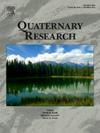1.5至0.5 ka期间,气候变化加剧了安第斯高原中南部的暴力活动
IF 1.8
3区 地球科学
Q3 GEOGRAPHY, PHYSICAL
引用次数: 0
摘要
安第斯山脉接触前的考古学为研究人类对气候变化的响应提供了理想的条件,因为该地区的极端气候变化、优秀的考古保存和强大的古气候记录。我们通过比较来自58个地点的2753个颅骨的骨骼创伤事件和Quelccaya冰川的冰积累率,评估了气候变化对安第斯山脉中南部约1.5-0.5 ka(公元470-1540年)人际暴力频率的影响。我们发现,在高地,识别人际暴力的几率平均增加了2.4倍(1.8-3.2;年冰量每减少10厘米,可减少95% C.I.)。我们的统计分析并没有发现在沿海或中海拔地区的人群中,冰的积累和人际暴力率之间的关系。这种差异可能是由于不同阶层的经济和社会政治策略不同造成的。干旱时期雨水灌溉农业的失败以及随之而来的组织政策的瓦解,可能使高地人口面临社会经济压力和对有限资源的暴力竞争。相反,低地和中部经济体之间的多样性可能缓冲了干旱的影响。本文章由计算机程序翻译,如有差异,请以英文原文为准。
Climate change intensified violence in the south-central Andean highlands from 1.5 to 0.5 ka
Abstract The archaeology of the pre-contact Andes provides an ideal study of human responses to climate change given the region's extreme climatic variability, excellent archaeological preservation, and robust paleoclimate records. We evaluate the effects of climate change on the frequency of interpersonal violence in the south-central Andes from ca. 1.5–0.5 ka (AD 470–1540) by comparing incidents of skeletal trauma observed among 2753 crania from 58 sites to rates of ice accumulation at the Quelccaya Glacier. We find that, in the highlands, the odds of identifying inter-personal violence increase on average by a multiplicative factor of 2.4 (1.8–3.2; 95% C.I.) for every 10-centimeter decrease in annual ice accumulation. Our statistical analysis does not detect a relationship between ice accumulation and interpersonal violence rates among coastal or mid-elevation populations. This disparity likely resulted from variable economic and sociopolitical strategies at different elevations. The failure of rain-fed agriculture during periods of drought and concomitant dissolution of organizing polities likely predisposed highland populations to socioeconomic stress and violent competition for limited resources. Conversely, diversity among lowland and midland economies may have buffered against the effect of drought.
求助全文
通过发布文献求助,成功后即可免费获取论文全文。
去求助
来源期刊

Quaternary Research
地学-地球科学综合
CiteScore
4.70
自引率
8.70%
发文量
57
审稿时长
3 months
期刊介绍:
Quaternary Research is an international journal devoted to the advancement of the interdisciplinary understanding of the Quaternary Period. We aim to publish articles of broad interest with relevance to more than one discipline, and that constitute a significant new contribution to Quaternary science. The journal’s scope is global, building on its nearly 50-year history in advancing the understanding of earth and human history through interdisciplinary study of the last 2.6 million years.
 求助内容:
求助内容: 应助结果提醒方式:
应助结果提醒方式:


